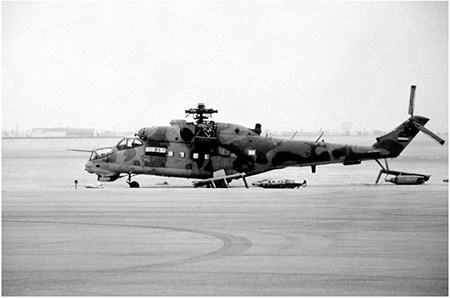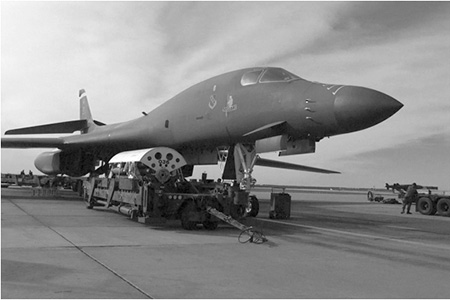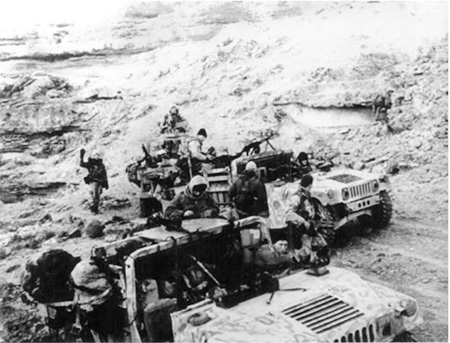Chapter Thirty Four
Escape from Bombing of Iraq
Around December 1998 tensions arising from the Weapons of Mass Destruction controversy were high between Iraq and the US and these were given momentum to divert attention from the Monica Lewinsky scandal in the US. When the scandal refused to go away Bill Clinton upped the ante and threatened to bomb Iraq. We were warned to be ready to leave at short notice and were under the impression that we could go through Turkey or Iran but these hopes were dashed when they both refused to allow us safe passage through their countries.
We worked from day to day with one eye on CNN as the drama unfolded. When the bombs began to fall on Baghdad we were put on a 30-minute standby to be ready to leave. Eventually, on the 20th December, we were given the word to depart. We sped down through the length of Iraq at 100 miles per hour. As we passed the villages and towns all the mosques were full to overflowing, out on to the courtyard and streets, with praying men. Down along the road, mile after mile, we could see helicopters parked under trees that lined the road. While American spokespersons were announcing the destruction of airfield after airfield they did not know that the vital hardware was still safe and operational.

An Iraqi MIL Mi-24 Hind helicopter captured in March 1991 during Operation Desert Storm. This helicopter type was used extensively against the Kurds and many of these machines sheltered under trees that lined the road as we departed from Iraq in December 1998.
Photo source: Staff Sgt. Dean Wagner.

This stealth bomber B-1B prepares for Operation Desert Fox in December 1998.
Eventually we reached Baghdad where we were met by Hans Graf Von Sponeck, the international Humanitarian Co-ordinator and successor to Dennis Halliday, and had lunch with him. He told us that the night before, the Mukhabarat Barracks, that was located about 400 metres from the Canal Hotel (the UN HQ where we were eating), was smart bombed. The bomb entered through the roof and burst through every ceiling in the high-rise building and went right through about five levels of basement where the prisoners were kept before it exploded. Von Sponeck said the UN women were terrified and crying as they sheltered under the stairs of the building. Two buses were then brought to the Hotel and loaded with UN personnel from all over Iraq. Roger, Mousa Olyan and I led the convoy of buses in our Land Cruiser, with our UN pennant straining from the car aerial, and made for the border, about five hours away. Our little Land Cruiser with its UN flag leading the convoy of buses through an Iraq that was being bombed by the UN put me in mind of a wagon train of homesteaders led by Cary Grant as they raced through hostile Apache country. As we journeyed through the night we passed numerous pick-ups armed with wicked-looking machineguns and manned by Mujahedin looking for any infiltrators in the desert.

US Delta force units Scud Hunting in the Desert. The Iraqis would be no match for them.
Photo: US DOD.
The US Seals, Delta Force and the British SAS were in the habit of crossing the Jordanian-Iraqi border to seek out and destroy Saddam’s Scud sites. From what I saw of Saddam’s men I did not fancy their chances against the SAS. At the border (that was closed to all traffic at the time) we were put through a long slow rigorous process at the Iraqi and Jordanian customs posts. When we drove out of the Jordanian side of the frontier we were met by a squadron of Jordanian motorcycle police and escorted through the night to Amman from where we all made it home for Christmas.
It was a welcome relief to enjoy the peace of Christmas at Cork. When I viewed the self-appointed celebrity Iraq experts, whose only qualification was the gift of the gab, pontificate on television on the Iraq situation it reinforced a dictum of my father’s ‘Never believe anything you read in the papers’. This stemmed from his experience in Canada in the 1930s, when he sold his business to go north to the Yukon on a gold rush only to find later that the rumour of the gold discovery was started by the owners of a hardware company.
When the situation stabilized I returned to Amman on 17th January 1999. When I got there I discovered that the Eid holiday to celebrate the end of Ramadan was in progress and the border to Iraq was closed. The border remained closed as King Hussein returned to Amman from the States, where he had undergone medical treatment, to a tumultuous homecoming. He rode through the streets in an icy rainstorm and then reassured the people that he had fully recovered from the lymphoma that had attacked him. However, the disease returned and he had to go back to the States on 27th January for further therapy, but not before he revised his will in which he dramatically disinherited his brother Hassan and named his son Abdullah as his successor. The medical treatment was unsuccessful and he returned to Amman to die. We were in Erbil as we watched his return on CNN. His helicopter that he insisted on piloting himself flew low over the city he ruled for so long. Then he bade goodbye to his people. He stood for hours greeting them as they lined up before him. He died on 7th February 1999 and was a great loss to sanity, pragmatism and stability in the entire region.
From July 1998 I frequently travelled to UN New York via Amman to report to UNDESA and to call for changes to the UN modus operandi in Iraq. I usually stayed about 10 days and met all the chiefs of the section dealing with Iraq. I attended a number of meetings and made my feelings regarding the UN performance known to all in a fairly aggressive way. A number of senior UN people from the associated Departments attended also to see the wild Irishman. I felt like Brendan Behan and had great difficulty not to let the wild image take over as I struggled to remain calm. I returned to Iraq in early August. The promised changes were still in the melting pot. It was rumoured that UNDP were going to do a top level assessment of the situation in Iraqi Kurdistan and it would take place shortly. I was happy that things were beginning to move at last and that my agitation for change was beginning to bear fruit. As a matter of fact Odeh had ceased visiting the north by then and I was left to run things on my own.
At the time Roger Guarda of UNDP was in New York being briefed on the situation in north Iraq. He arrived in Iraq a few days after my return from New York. He met with Odeh and Dennis Halliday in Baghdad and traveled north on the 6th August. Azziz and I travelled to the border of the autonomous area with Iraq and escorted him to Erbil. He told me that he had retired but grew disenchanted with the Belgian rain and his phlegmatic countrymen. He lived in an apartment at the edge of the Waterloo battlefield and had a son who was studying in Cairo. It is easy to understand that he found it difficult to settle down during his retirement having regard to the exciting locations he worked in before he was offered the job in Iraq. He came initially on a fact-finding mission and when he submitted his report towards the end of August he had essentially come to the same conclusions as I had done but with a UN twist. He recommended that the responsibility should be removed from New York and shifted to the area of implementation i.e. to northern Iraq. Staff capacity should be increased and be commensurate with the task. Finally, New York should macro manage instead of the micro management to date and staff functions should be clearly defined. I was very happy that now I had a boss who was singing from the same hymn sheet. Roger stayed in the north until the 23rd August and then he returned to New York and home to prepare for his taking up the position of Director.
With Roger now in the Director’s chair we began preparations for the change of agency. As the time of decision for the new direction of the programme approached Roger and I travelled to New York a number of times for meetings with UNDESA and UNDP. Before one of these trips one of the drivers asked me to get a special dog harness in New York for a dog he was going to purchase in Baghdad. “Mr Dan” he said his eyes gleaming “its pedigree is great. A friend of mine got one of them and when thieves tried to rob his house the dog attacked them. He killed one thief and badly injured the other.” It was difficult to reconcile the living conditions of this man with those of the people in New York who were responsible for ameliorating his situation. Did New Yorkers really understand what Saddam and Sanctions had done to him to change his perceptions so dramatically from their own?
We lobbied continuously for direct execution by UNDP of the Electricity Sector Programme in the North of Iraq. We met with Benon Sevan in his New York office a number of times and Roger acquitted himself admirably. Finally, Sevan came down in favour of direct execution for UNDP of the procurement and reconstruction programme in the north. The programme was the biggest one of its kind in UN history and the rules and regulations that pertained up to then had to change in line with the reality of Iraq.
A large equipped conference room was provided in Erbil and Roger and I sourced an office in Amman that would serve us well for our projected Regional Procurement operation that was to replace the New York Procurement system. It was near the main UNDP building in the city. Roger had headhunted Peter Adler to manage the procurement process in Amann. We still had to contend with the New York Sanctions Committee but the contracts end would be under our control and would be the nearest to Commercial Practice that the UN would allow.
In 1979 Peter Adler, a physicist with a PhD in Physics and Chemistry had joined International Atomic Energy Agency (IAEA) in Vienna as Chief of its Field Procurement Section. He moved to UNDP/IAPSO in Geneva as its Senior Technical Advisor in 1986. He became Director of the Division of Procurement Services in Copenhagen, Denmark in 1990. In 1998, Peter became UNDP’s Senior Procurement Advisor to the Assistant Administrator of UNDP in New York. He joined the Programme in 1999 to give the Procurement Division in Amman a kick start.
Long meetings with the clerical people were commonplace now as Roger set up a typical UNDP operation with the required procedures cemented into place. However, the provision of technical staff was still a non-starter. The number of clerical and administrative staff was now a multiple of the technical staff with no improvement in the provision of engineers by New York. In spite of the downturn in the Asian Economy the UN were unable to attract staff in sufficient numbers. The only engineers willing to go to Iraq were Indian. Murthy and the UN in New York were offering a salary level for the rank and file that was acceptable to people from India but it was not enough to tempt Western engineers to overcome their aversion and fear of Saddam.
I was also concerned at the type of relatively unknown firms particularly from India that were supplying us with equipment. After discussing the matter with Michael Higgins in New York we decided that I should go to Bosnia, Egypt and India to recruit engineers and that while in India I would inspect the firms that were now supplying us with equipment. I stated categorically that I would not go recruiting on my own. During the Christmas vacation at home I got a phone call from a recruiting company in the north of Ireland. I do not know how they got my home number but I answered yes, that I was looking for 30 engineers. The individual who rang me said that he could provide them and told me that if I did business with him it would be worth $180,000 ($6,000 for each engineer supplied) to me. I replied that I was not interested and he asked me did I want more. I replied that I did not operate that way and the phone went dead. I often wondered about that call. Surely if I wasn’t interested in bribes he should have jumped at the chance to off-load 30 engineers off his books. Perhaps it was a sting operation.
Having regard to the potential for bribery I asked that Mousa Olayan, in whom I had complete confidence, should accompany me; Roger agreed. We set out in the middle of February and arrived in Amman where we conducted some procurement business, visited the concrete pole factory where I still had a live interest and visited the Jordanian Electricity Company Training School. We also did some work and interviews at the UNDP office there for people to operate the procurement operation. Then we went on to Cairo where we interviewed a number of senior engineers.